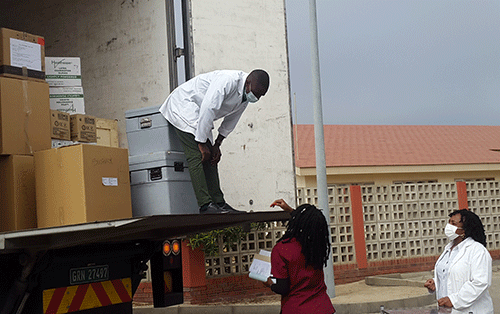WALVIS BAY – Namibia’s coronavirus vaccination efforts got off to a very slow start, with only 71 healthcare workers inoculated against Covid-19 by yesterday afternoon as fears of a third wave mount large across the world.
The health ministry yesterday announced 51 frontliners have been vaccinated in Khomas, while a paltry 20 have received the Covid-19 vaccine jabs in Erongo since the start of the vaccination campaign last week Friday.
This is despite the ministry targeting to vaccinate at least 2 500 frontline and healthcare workers in Erongo with the Sinopharm Covid-19 vaccine that was donated by the Chinese government to Namibia.
The health ministry itself anticipates vaccinating over
5 000 healthcare workers and 95 000 citizens during the first round of vaccination. Erongo health director Anna Jonas confirmed yesterday only 14 health workers from Swakopmund and six from Walvis Bay turned up to be vaccinated.
“None of the private healthcare workers has been vaccinated nor shown interest so far,” Jonas told New Era. Jonas, during the launch of the vaccine campaign in Swakopmund on Friday, said they are prioritising both frontline and healthcare workers in the first phase at the two towns before they extend it to the other towns in the region.
“We will see how and whom we will prioritise in the second phase before we roll it out to the whole of Erongo,” she said on Friday.
She, however, did not give a time frame for the roll-out, as more vaccines are expected to arrive in the country.
“For now, we are rolling out Sinopharm and we also expect the arrival of other vaccines,” she said.
Some health workers New Era spoke to over the weekend, however, remained sceptical about getting vaccinated. A nurse at the Walvis Bay state hospital, who humbly requested anonymity, said she was exposed to Covid-19 on several occasions but has always managed to avoid contracting the virus.
“Overall, I do not want to be vaccinated simply because I adhere to the current regulations and I have taken extra precautions at work,” she explained.
Another nurse also echoed the same sentiments, saying there have been too many speculations around the various vaccines that clouds her judgement as to whether or not she should take the vaccine or not.
“It is, however, a personal choice; one should not discourage people who want to take it,” she said.
Explaining the process, Dr Marita Mouton, a senior medical officer for the ministry, said anyone who wants to be vaccinated will have to fill in and sign a consent form first.
“You will then have to complete a checklist to determine if you are eligible and to check if you have any allergies or had any reactions to previous vaccinations. This list will tell us who is likely to have any adverse effects to the vaccine,” Mouton said.
She added once vaccinated, the process requires the person inoculated to sit at least for 20 minutes as a precautionary measure.
“However, based on data available, it is unlikely that someone will develop severe side effects, but we a have a mini-station prepared in case of an emergency,” she explained.
She added that anyone who had contracted Covid-19 before can also get vaccinated but only after 60 days.
Namibia last week received 100 000 Covid-19 doses donated by the Chinese government.
On Saturday, the country also took delivery of 30 000 Covishield vaccine doses donated by the Indian government.
The country is still waiting for the arrival of Covid-19 vaccines sourced through the United Nation’s Covax scheme. Namibia has thus far 498 deaths due to Covid-19, with 42 771 cumulative confirmed cases. The recovery rate stands at 93%.
Third-wave fears
Meanwhile, several European countries have activated response measures as fears over a possible Covid-19 outbreak third wave looms large, sparking new lockdowns.
In neighbouring South Africa, there was a growing concern that the country was heading into a third wave as early as the Easter weekend next week.
- edeklerk@nepc.com.na


